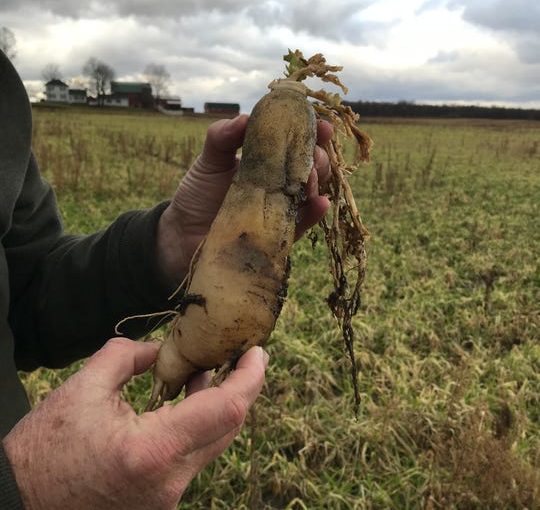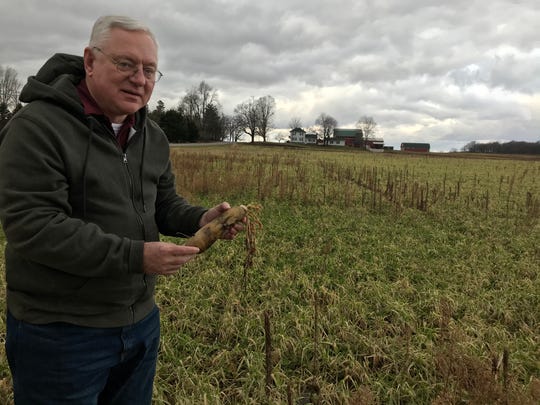Jan 3, 2020Funky smell traced to rotting radishes, sound farming practice
It wasn’t sewage, gas leaks, rotten eggs or dead bodies that caused a strange odor during much of December around Grand Ledge, Michigan.
According to a Jan. 1 story in the Lansing State Journal, there was a much more unlikely source of a funky smell: radishes. Specifically it was the rotting of daikon radishes, a Japanese root vegetable, planted in farmers’ fields as a cover crop after an unusually wet spring.
The newspaper reported Grand Ledge-area residents complained about the unpleasant scent on social media and called a township office questioning the source of it.
The stink was caused by an unusual set of circumstances.
To start, you can blame the weather.
Dave Edwards is an Oneida Township farmer. He said the rain this spring delayed planting, leaving him with many open fields – only 900 acres of the usual 3,000 were planted.
He normally plants 1,600 acres of corn but only got 170 acres in because of the wet spring. Many farmers like Edwards had to forgo corn planting.
“There’s never been a year like this of crops not getting planted,” Edwards said. “This year was a totally abnormal year.”

Edwards said he decided that the disastrous year could be an opportunity to try cover crops that he learned about from the Natural Resources Conservation Service in Charlotte, part of the U.S. Department of Agriculture.
It’s the first time he’s used the seed mixes, he said, which include grasses, legumes and daikon radishes. It’s a much more common practice in the South, where there’s a longer growing season.
The State Journal story also reported:
The idea isn’t to harvest the crops but to let them decompose so they nourish the ground, keep it aerated and prevent soil from eroding.
“All these cover crops did their job beautifully for saving the soil and increasing organic matter in the soil and keeping the nutrients in place so they don’t leach out,” Edwards said.
Edwards said the weather was so ideal for the radishes that they grew fast and big. But instead of quietly rotting under the cover of snow, it warmed up in December and the scent of decomposition filled the air.
Rick Jones, a former state senator and Eaton County sheriff, has been on an educational mission to get better public relations for the radishes. Growing them results in better erosion control and less fertilizer use.
Also, he didn’t want people to worry that there was something wrong. The smell was an unfortunate side effect of an otherwise positive experience.
“This is a good, sound farming practice. It’s very organic,” he said. “If we’re going to live around farms, there’s going to be odors.”
He said he was exposed to the idea of daikon radishes as cover crops during a Michigan Farm Bureau tour when he was a state senator.
Brian Reed, the manager of Delta Township, said his office fielded a handful of calls in December from residents worried about natural gas or sewer leaks.
His staff quickly determined the odor was coming from farm fields.
“It’s kind of a common farming practice. I think because we had some unseasonably warm weather, the smell traveled further,” he said. “It wasn’t just in Delta Township. It was all around the area.”
The good news for nearby residents is that, as cold weather hits, it’s likely to go away. It takes a few days of cold weather, 25 degrees or lower, to kill the radishes.
Edwards, the farmer, said it already looks like the radishes did their job in preventing erosion. He’ll know more about the quality of the soil when he plants in the spring.
“It was a great opportunity – other than the smell,” he said.

















